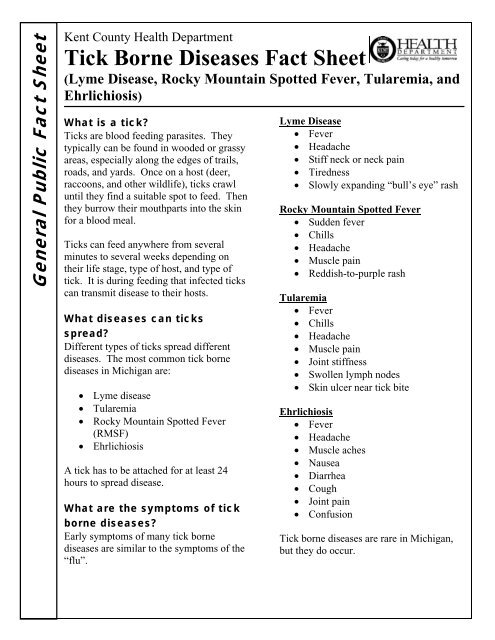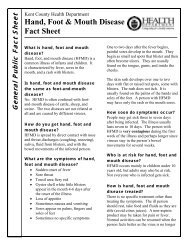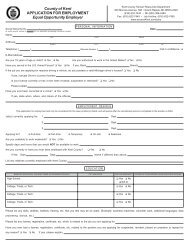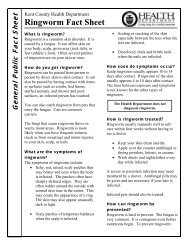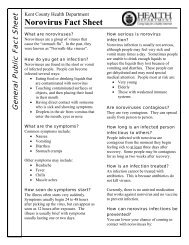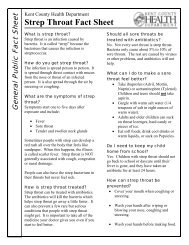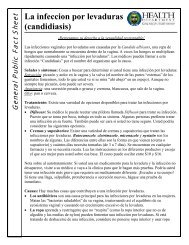Tick Borne Diseases Fact Sheet - Kent County, Michigan
Tick Borne Diseases Fact Sheet - Kent County, Michigan
Tick Borne Diseases Fact Sheet - Kent County, Michigan
You also want an ePaper? Increase the reach of your titles
YUMPU automatically turns print PDFs into web optimized ePapers that Google loves.
General Public <strong>Fact</strong> <strong>Sheet</strong><strong>Kent</strong> <strong>County</strong> Health Department<strong>Tick</strong> <strong>Borne</strong> <strong>Diseases</strong> <strong>Fact</strong> <strong>Sheet</strong>(Lyme Disease, Rocky Mountain Spotted Fever, Tularemia, andEhrlichiosis)What is a tick?<strong>Tick</strong>s are blood feeding parasites. Theytypically can be found in wooded or grassyareas, especially along the edges of trails,roads, and yards. Once on a host (deer,raccoons, and other wildlife), ticks crawluntil they find a suitable spot to feed. Thenthey burrow their mouthparts into the skinfor a blood meal.<strong>Tick</strong>s can feed anywhere from severalminutes to several weeks depending ontheir life stage, type of host, and type oftick. It is during feeding that infected tickscan transmit disease to their hosts.What diseases can ticksspread?Different types of ticks spread differentdiseases. The most common tick bornediseases in <strong>Michigan</strong> are:• Lyme disease• Tularemia• Rocky Mountain Spotted Fever(RMSF)• EhrlichiosisA tick has to be attached for at least 24hours to spread disease.What are the symptoms of tickborne diseases?Early symptoms of many tick bornediseases are similar to the symptoms of the“flu”.Lyme Disease• Fever• Headache• Stiff neck or neck pain• Tiredness• Slowly expanding “bull’s eye” rashRocky Mountain Spotted Fever• Sudden fever• Chills• Headache• Muscle pain• Reddish-to-purple rashTularemia• Fever• Chills• Headache• Muscle pain• Joint stiffness• Swollen lymph nodes• Skin ulcer near tick biteEhrlichiosis• Fever• Headache• Muscle aches• Nausea• Diarrhea• Cough• Joint pain• Confusion<strong>Tick</strong> borne diseases are rare in <strong>Michigan</strong>,but they do occur.
<strong>Tick</strong> <strong>Borne</strong> <strong>Diseases</strong> <strong>Fact</strong> <strong>Sheet</strong> – page 2<strong>Tick</strong> borne diseases can be serious if notproperly diagnosed and treated. If you areill and have had recent exposure to ticks, itis important to tell your doctor. Thisinformation could help accurately diagnosewhat is wrong with you.How are tick borne diseasestreated?Lyme disease, Tularemia, Rocky MountainSpotted Fever, and Ehrlichiosis are alltreatable with antibiotics. People anddomestic animals treated in the early stageswith short courses of antibiotics usuallyrecover quickly and fully.How can tick borne diseases beprevented?<strong>Tick</strong>s can attach to any part of the humanbody but prefer body creases and areas withhair such as the groin, armpits, sock lineand scalp. The best way to prevent tickborne diseases is to reduce your risk ofbeing bitten by a tick.• Wear clothing that covers the arms,legs, and feet whenever you areoutdoors.• Wear light colored clothing to spotticks easily.• Apply insect/tick repellentcontaining DEET. Follow theproduct label directions for properuse.• Walk in the center of trails to avoidcontact with overgrown grass andbrush at the edge of the trail.• Check yourself, your children andpets thoroughly for ticks. Carefullyinspect areas around the head, neckand ears. Look for what may appearlike a new freckle or speck of dirt.What do I do if I am bitten by atick?If you find a tick attached to your skin,promptly remove it. Grasp the tick usingtweezers as close to the skin as possible.With a steady motion, pull the tick straightout. Do not twist or jerk. If tweezers arenot available, grasp the tick with a piece oftissue. Wash your hands and applyantiseptic to the bite.Occasionally, mouthparts of the tick stayattached to the skin. The mouthparts willnot cause disease. If this happens, consultwith your doctor about their removal.Monitor the bite and be alert for earlysymptoms of tick borne disease particularly“flu-like” symptoms or rash over the nextmonth or so. If you develop symptoms, callyour doctor.This fact sheet is for information only and isnot meant to be used for self-diagnosis or as asubstitute for talking with a health careprovider. If you have any questions about tickborne diseases or think you may have one, callyour health care provider.©2005 <strong>Kent</strong> <strong>County</strong> Health Department700 Fuller Ave NEGrand Rapids, <strong>Michigan</strong> 49503616/632-7100www.accesskent.com


